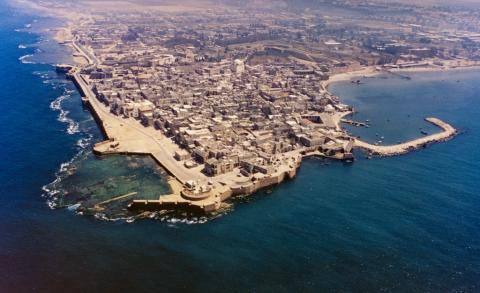My mother, my Aunt Khánum, my three sisters, and I lived in the bigger house at `Akká with our beloved Father; Bahá’u’lláh lived at Bahji. At this time the people of the place greatly respected and honoured Him and the Master, and we were as happy as was possible in the unhealthy atmosphere of `Akká. On this day of sadness a servant rode in from Bahji with a tablet for the Master from Bahá’u’lláh: "I am not well, come to Me and bring Khánum." The servant, having brought horses for them, my Father and my aunt set off immediately for Bahji; we children stayed at home with my mother, full of anxiety. Each day the news came that our adored Bahá’u’lláh's fever had not abated. He had a kind of malaria. After five days we all went to Bahji; we were very distressed that the illness had become serious. On the fifteenth day of the illness the Persian pilgrims and Bahá’í friends from `Akká were admitted to His presence.
Mirza `Andalib from Shiraz, Mirza Bassar, the blind poet, were there. They, weeping, circled round and round His bed, praying and beseeching Bahá’u’lláh to permit them to be a sacrifice for the saving of His precious life for the world, if only for a short time longer. Bahá’u’lláh spoke loving words of peace and calm to them, exhorting them to be faithful to the Cause of God, to be loyal, true, and steadfast, letting their characters speak to the world. "I am very pleased with you all. My hope is that your deeds will be examples worthy of the Bahá’í Faith - that you may ever be true followers of the Light of God's Law."
Two lambs were brought into His room, then the Master went into `Akká to arrange various matters, to see the friends, giving the good news that His Father was slightly better. He then superintended the distribution of the two sacrificial lambs amongst the poor prisoners of `Akká. In the evening He came back to Bahji.
Bahá’u’lláh asked for us, the ladies and children, to go to Him. He told us that He had left in His will directions for our future guidance; that the Greatest Branch, `Abbas Effendi, would arrange everything for the family, the friends, and the Cause. "The loving devotion of `Andalib has touched me very much, also the love of them all. I hope they will every one be true and faithful servants."
On the nineteenth day of His illness He left us at dawn. Immediately a horseman galloped into `Akká to carry the news to the Mufti. Forthwith from the seven minarets of the mosque the event was proclaimed:
"God is Great. He Giveth Life! He Taketh it Again! He Dieth No, but Liveth for Evermore!"
This proclamation from the minarets is a custom of Islam at the passing of a very greatly honoured, learned, and holy man.
The tidings spread throughout the land, and were proclaimed from the minarets of every mosque. People from all the villages of the country-side crowded to Bahji to show their respect, and to join in the mourning. Many Shaykhs brought lambs, rice, sugar and sale. This is an Arab custom: the idea is, that as these gifts are distributed to the poor, they will, in return, pray for the soul of the departed.
Muslim friends, the Mufti, mullas, Governor and officials, Christian priests, Latin and Greek, Druses from Ab'u-Sinan, and surrounding villages, and many other friends gathered together in great numbers in honour of the Beloved One.
Marthiyih, songs in His praise, were chanted by poets. Laments and prayers were chanted by Shaykhs. Funeral orations were spoken, describing His wonderful life of self-sacrifice.
Many of the guests encamped under the trees round the Palace of Bahji, where more than five hundred were entertained for nine days. This hospitality entailed much trouble on the Master, Who made all the arrangements and superintended every detail; money also was given by Him on each of the nine days to the poor.
At dawn on these days the "Call to Prayer" and some of the "Munajats" (prayers chanted) of Bahá’u’lláh were chanted from the balcony of the palace. Very touching and impressive it was to hear the beautiful voice of our Arabian Bahá’í friend, chanting the call to prayer. At its sound the Master arose, and we all followed Him to the tomb-shrine, where He chanted the funeral prayer and the
Tablet of Visitation.
